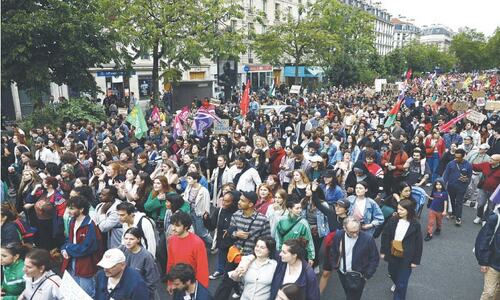UNITED NATIONS, Dec 8: The absolute ban on torture, a cornerstone of international human rights, is becoming a casualty of the US led ‘war on terror’ through loosened legal definition, secret detention, handover of prisoners without adequate safeguards and other practices, the United Nations High Commissioner for Human Rights said on Wednesday.
“Pursuing security objectives at all costs may create a world in which we are neither safe nor free,” Louise Arbour told correspondents at United Nations headquarters in New York in the run-up to Human Rights Day to be observed on December 10. “This will certainly be the case if the only choice is between the terrorists and the torturers.”
Ms Arbour’s statement enraged the US Ambassador to the United Nations, John Bolton, who chided her saying, “It is disappointing that she has chosen to talk about press commentary about alleged American conduct. I think the secretary of state has fully and completely addressed the substance of the allegations, so I won’t go back into that again other than to reaffirm that the United States does not engage in torture.”
In her statement Ms Arbour observed, “Governments are watering down the definition of torture, claiming that terrorism means established rules do not apply anymore”.
She called on all governments to reaffirm their commitment to the absolute prohibition of torture by condemning torture and cruel, inhuman or degrading treatment and prohibiting it in national law.
She said the right and duty of governments to protect their citizens from attacks is not in dispute. Governments may even impose limitations on certain rights at times of imminent or clear dangers.
But, she added, the right to be free from torture may not be subject to any limitation, anywhere, under any condition.
She singled out two practices as having a particularly corrosive effect: the recourse to so-called ‘diplomatic assurances’, and the holding of prisoners in secret detention.
“The former may make countries complicit with torture carried out by others, while the latter creates the conditions for torture by one’s own,” she said.
Holding people in secret detention amounts to ‘disappearance’, which itself amounts to torture or ill-treatment, she said. In addition, prolonged incommunicado detention or detention in secret places facilitates the perpetration of torture.
Responding to questions concerning allegations that the United States has been keeping people in such detention in various parts of the world, she said that, not knowing the facts, she could not play the judge.
Her role was to make sure that the norms against torture hold, laws are being applied and, most importantly that both the norms and the actual activities are open to the light of day.
“I don’t think it’s appropriate for those who purport to act in our names, to ask for a blank check — ‘just trust us, there are very bad things happening out there, we’ll handle it and the less you know the better’. I think that’s completely inappropriate in democratic societies,” she said.
“The law provides the proper balancing between the legitimate security interests of the state with the individual’s own legitimate interests in liberty and personal security. It must do so rationally and dispassionately, even in the face of terror,” she added.
The US Ambassador John Bolton took exception to Ms Arbour’s statement and in a hurriedly called press briefing harshly criticized her saying, “I think it is inappropriate and illegitimate for an international civil servant to second-guess the conduct that we’re engaged in the war on terror, with nothing more as evidence than what she reads in the newspapers.”
“It would be appropriate, I think, for the UN’s high commissioner for human rights to talk about the serious human rights problems that exist in the world today,” Bolton told reporters.











































Dear visitor, the comments section is undergoing an overhaul and will return soon.